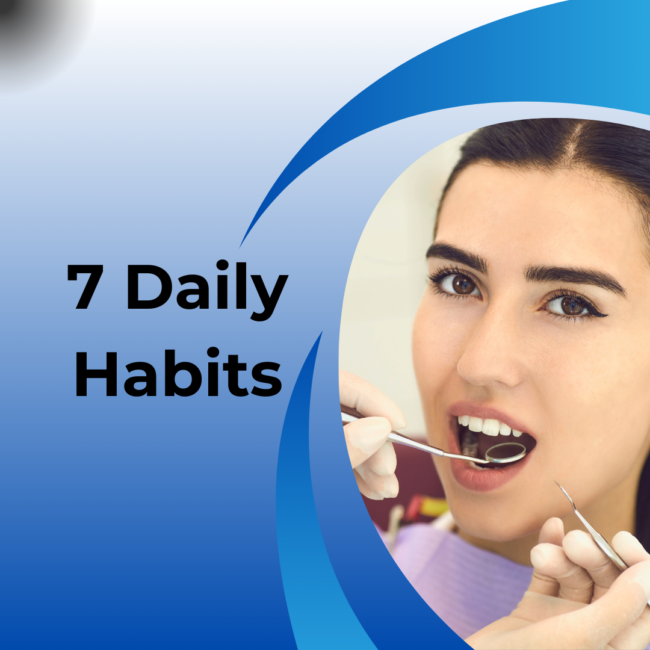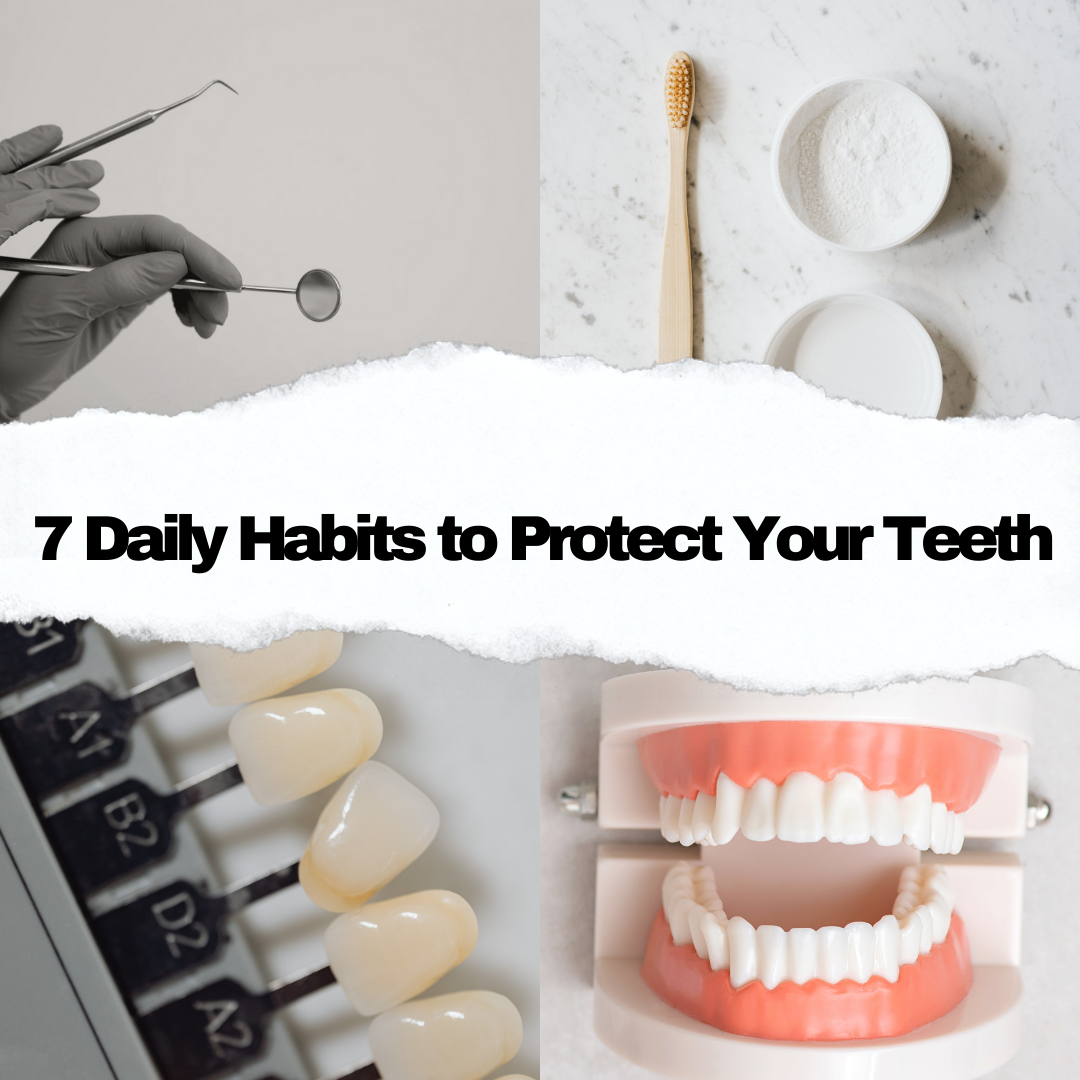When it comes to maintaining a healthy smile, the foundation lies in the daily habits we cultivate. These simple yet effective practices can make a significant difference in our oral health, potentially reducing the need for frequent visits to a dentist.
Importance of teeth Protection:
1. Prevent Tooth Decay and Cavities :
The process of decay of teeth starts with the formation of plaque on the surface of your teeth. Regular visits to the dentist will help you spot cavities early. Using fluoride toothpaste, brushing regularly, and consuming less sugar are some of the essential steps to safeguard your teeth.
-
Protection Against Sensitivity and Pain
Sensitivity of teeth can be the result of flare-up of enamel. Tooth pain can to some extent occur because of exposure of parts of the teeth which are normally sealed off, coupled with the consumption of hot or sweet food. Eliminating or at least reducing the intake of acidic rich foods, along with following a more effective oral hygiene will greatly reduce the discomfort.
-
Sustaining Oral Hygiene and General Health
Your overall well-being relies on the state of your oral health. Uncontrolled gum disease can develop into severe disorders such as heart disease and diabetes. Regular oral checkups and good oral practices during health to ensure that oral health is optimal.
-
Retuning The Structure and Function of The Tooth
Loss of teeth as a result of decay or trauma can affect chewing, speech, and self-esteem. With proper oral care like sports mouth guards and prophylaxis, your natural teeth will be preserved.
-
Benefits in The Downtime and Economically
Preventive care in dentistry is economical because it alleviates the need for restorative procedures, such as fillings, crowns, or root canals, down the line. With proper oral hygiene and regular check ups, these costly treatments become unnecessary.
7 Daily Habits to Protect Your Teeth

7 Daily Habits for teeth
-
Take care of your teeth.
A soft toothbrush with fluoride toothpaste can remove plaque and bacteria that may form cavities and gum infections. Make sure you brush in circles, brush two times a day for 2 minutes each time in addition to the usual back-and-forth direction, on every side of your teeth so that you do not miss any spots.
-
Prevent accumulation of plaque through daily flossing.
Flossing is an important activity since it helps in cleaning between teeth which a toothbrush cannot. Make sure you floss every day. It minimizes plaque buildup, and therefore reduces the chances of gum disease and cavities. Use dental floss or interdental brushes as A morning brush fights morning breath.
-
Use antibacterial mouthwash.
Mouthwash kills bacteria, refreshes breath, and minimizes plaque buildup. Don’t overbrush. Consider getting a mouthwash that contains fluoride, as it aids in strengthening and decaying teeth at the same time.
-
Avoid Sugary and Acidic Foods
Cake and other sugary foods encourage the growth of bacteria, enabling cavities to form. Acidic food slowly destroys enamel, making teeth more prone to rotting. Don’t turbocharge your brushing—using too much pressure can wear down enamel and damage gums. Sugary drinks should be exchanged with water, while dairy products should be consumed to infuse the body with calcium. Avoid soda, as it is highly acidic and can erode enamel over time.
-
Stay Hydrated and Drink Plenty of Water
Water plays an important role in removing food scraps, neutralizing acids, and activating saliva production which reduces the risks of dry mouth and dental cavities. Drinking is an effective way to ingest supplements as they contribute towards enamel protection, as well.
-
Schedule Regular Dental Check-Ups
Routine dental visits help in early detection of dental issues. Professional cleanings remove plaque and tartar, reducing the risk of cavities and gum disease. Comprehensive dental services ensure that your teeth remain healthy and strong.
-
Avoid Tobacco and Excessive Alcohol Consumption
Cigarettes and alcohol cause various diseases which include gum disease, discoloration of teeth, and even cancer. The cessation of tobacco products and drinking at controlled levels can drastically change how you feel about yourself and your health.
It Doesn’t Matter When You Do It
The order in which one brushes or flosses, is up to them and what is done has to be done daily. According to the American Dental Association, whether you decide to floss prior to brushing the teeth or vice versa, it is your decision so long as you do it properly.
Risk Management and Why It’s Important to Regularly Visit the Dentist
Dental health and hygiene is aided by professional services that are provided within the institution. Here are some of the services that are provided or offered when one attends the check-ups:
- Prosthetic Dentistry: Armamentariums such as dentures and prosthetics are used for edentulous patients or those with missing teeth to help sustain functionality.
- Preventive Dentistry: Basic hygiene checkups, cleaning of teeth, application of fluoride, and sealants.
- Restorative Dentistry: Also known as Modern Cosmetic Dentistry, this technique and process include the use of crowns, fillings, veneers, bridges, and implants, all in one, to restore function and beauty.
- Emergency Procedures: Treatment of dental aches, extraction of teeth, that are abraded or infected, immediate consideration.
- Pediatric Dentistry: And for young people, gentle nurturing procedures help maintain healthy gums and teeth and make them dental friendly.
Preventing tooth decay would help you achieve a healthy-looking smile. Effective maintenance of oral hygiene, combined with regular visits to the clinic means no dental problems and achieving optimum mouth health. Delayed dental issues treatments may lead to more complicated conditions, making it essential to see the dentist regularly. Your teeth can gleam with pride if you take care of them with regular proactive checkups, hygiene services, and consultative care.

COMMENTS